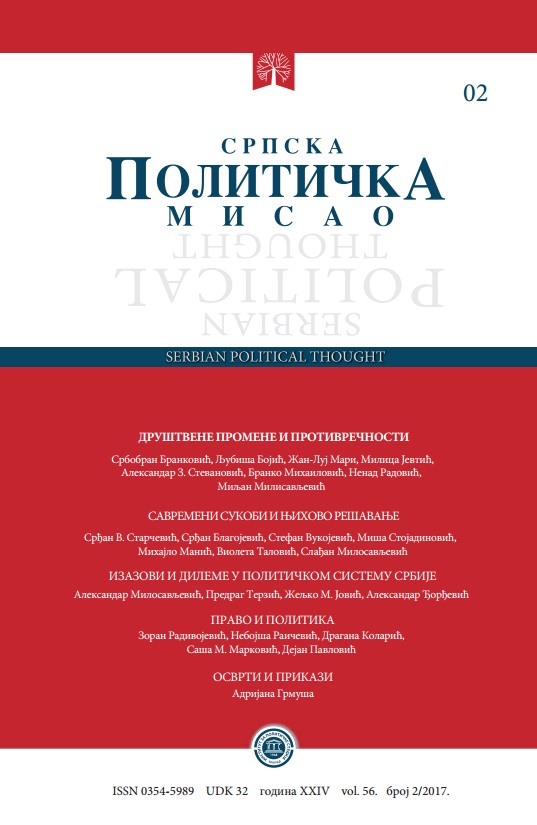Кревелдов спор са Клаузевицем – да ли је смисао рата политички?
Creveld’s Dispute with Clausewitz – Is the Essence of War in the Sphere of Politics?
Author(s): Srđan V. Starčević, Srđan BlagojevićSubject(s): Social Philosophy, Comparative politics, Peace and Conflict Studies
Published by: Институт за политичке студије
Keywords: war; politics; social conflict; struggle; political goal; interest; value
Summary/Abstract: Studying the reasons behind the inability of modern armed forces, including those belonging to extremely powerful states, to gain a victory in low-intensity conflicts, Martin van Creveld came to a conclusion that what lies at the root of the problem is Clausewitz’s understanding of war, due to which he tried to reevaluate Clausewitz’s theory of war. This paper critically examines the key arguments used by Creveld in order to refute Clausewitz’s concept of war as a political instrument: firstly, before the creation of modern states (i.e. before 1648) war had not been trinitarian during a long period of history, and outside European borders, and prior to Europe’s colonial influence and decolonization process, as well as during Clausewitz’s time, a state was not an only entity capable of war; secondly, the total war marks the end of a war as the instrument of politics, because it overcomes states, governments, people, politics and economy; thirdly, war has not always been only an extended arm of politics, but also of justice, religion and mere existence. Creveld is right when arguing that war may be lead not only by a state but also by some other entities. However, Clausewitz did not claim the opposite. The Prussian General also recognized that war had not always been strictly business of a government, but that it became that in the 17th century. According to Clausewitz, war again became people’s business after the changes occurring in France in 1793. In order to illustrate the spread of this phenomenon in Europe, Clausewitz uses the same example as Creveld – the national uprising against Napoleon’s government in Spain. In addition, Clausewitz was also aware that the time of limited war had passed and that after Napoleon, whom he calls the god of war himself, war would start approaching its abstract form. However, what does not stand is Creveld’s idea that such a war is a kind of independent „monster”, out of the politics, and perhaps even above it. Looking at the First World War, Creveld points out that by 1916, the war had become so independent of the politics that even the most decisive statesmen were not able to escape from it, which, in his opinion, refutes Clausewitz’s thesis of a war as an instrument of politics. However, when shifting attention from the Western to the Eastern Front, one would see that what led to the end of the war was the radical change of politics in Russia after the October Revolution. When it comes to the extraction of war from the political sphere, whether it is understood as a means of law/justice, religion, survival or it has a sphere of its own, different from the political, legal, religious and existential ones, there is a serious discrepancy between Clausewitz’s and Creveld’s understanding of politics, and precisely because of this difference there is a gap between their theories. The notion of war as a continuation of law/ justice or religion is a consequence of the narrowing of a political framework. Creveld reduces politics to the affairs of the state or the ruler. On the other hand, Clausewitz expands the concept of politics to its sociological and even philosophical understanding. Creveld is closer to understand the politics as the art of management, whereas Clausewitz is closer to the definition of politics as the general social process of directing society towards certain goals. The paper shows that the gap between Clausewitz’s and Creveld’s notions of the causes of war results from different views these two theoreticians have on war. It was concluded that the enemies in the war fight to achieve their goals, namely to realize/protect what they perceive as their interest, and/or expand or defend their (social or collective) values, which all defines the goals of war taking into consideration both Clausewitz’s view from the top, from the position of decision-makers, as well as Creveld’s view from the bottom, from the position of those members of society (groups) who are going to the war. The authors conclude that the ferocity of war as a form of social conflict is manifested in the armed struggle, but its essence is always in the political sphere.
Journal: Српска политичка мисао
- Issue Year: 2017
- Issue No: 2
- Page Range: 117-134
- Page Count: 18
- Language: Serbian

